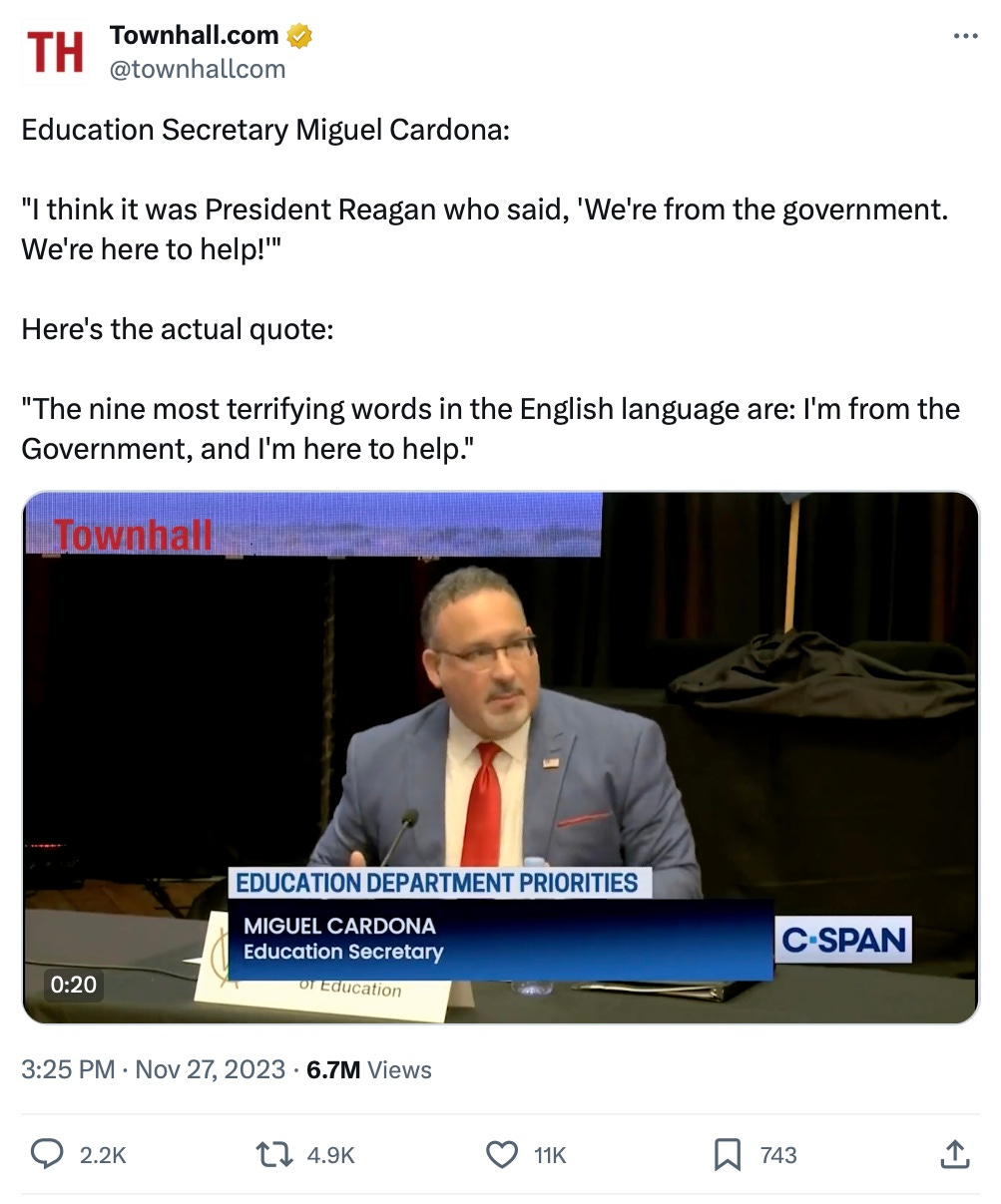Administrative Kangaroo Courts v. the Constitution
Plus: The errors of socialism, President and Mrs. Carter, and the wrong half of a Reagan quote.
Do Americans still possess the right to a jury trial?
On Wednesday the Supreme Court heard oral arguments in Securities and Exchange Commission (SEC) v. Jarkesy. The justices will determine the constitutionality of administrative law judges (ALJs), bureaucrats who in many proceedings brought by their respective agencies substitute for district courts.
Readers may recognize these questions from April’s Axon v. Federal Trade Commission (FTC), in which the High Court allowed a similar challenge to FTC ALJs to proceed in federal court.
The ALJ system — which allows the government to deprive citizens of core private rights without a jury trial — is politically corrupted and incompatible with the Seventh Amendment (as the 5th U.S. Court of Appeals ruled). Moreover, it provides no cognizable public-policy benefit; it merely removes an important check on bureaucratic overreach.
In a piece this week in Reason, this author argued as much and offered muchneeded historical context.
The real benefits of the ALJ system accrue to regulators, whom it frees from the constraints of ordinary due process and checks and balances. “The accumulation of all powers, legislative, executive, and judiciary, in the same hands, whether of one, a few, or many, and whether hereditary, self-appointed, or elective, may justly be pronounced the very definition of tyranny,” as James Madison wrote in Federalist No. 47.
The right to trial by jury, developed in the English common law, is central to the Anglo-American conception of good governance. Noted 18th-century English jurist William Blackstone declared the right “the glory of the English law.” John Adams called it (alongside representative government) “the heart and lungs of liberty.” And Thomas Jefferson considered it “the only anchor ever yet imagined by man, by which a government can be held to the principles of its constitution.”
Moreover, concern for jury trials shaped early American political history. The Declaration of Independence denounced King George III for “depriving” Americans of jury trials. During the ratification era, the original Constitution's failure to guarantee jury trials in civil cases drew fierce criticism from such eminent leaders as Virginia's George Mason and Massachusetts' Elbridge Gerry. This movement culminated in the Seventh Amendment's ratification.
The American legal system—when functioning properly, at least—prevents the state from satisfying itself with a citizen's guilt and summarily punishing him. Instead, officials must convince a jury of the accused's peers—generally in an open courtroom. Luckily, Mason, Gerry, and others lobbied for the Seventh Amendment. It was designed to prevent precisely the sort of tyrannical shenanigans that Madison warned of and that the ALJ system promotes.
Some Wisdom
Friedrich Hayek’s The Fatal Conceit is not overrated — which is significant praise.
He begins thus:
This book argues that our civilisation depends, not only for its origin but also for its preservation, on what can be precisely described only as the extended order of human cooperation, an order more commonly, if some- what misleadingly, known as capitalism. To understand our civilisation, one must appreciate that the extended order resulted not from human design or intention but spontaneously: it arose from unintentionally conforming to certain traditional and largely moral practices, many of which men tend to dislike, whose significance they usually fail to understand, whose validity they cannot prove, and which have nonetheless fairly rapidly spread by means of an evolutionary selection — the comparative increase of population and wealth — of those groups that happened to follow them. The unwitting, reluctant, even painful adoption of these practices kept these groups together, increased their access to valuable information of all sorts, and enabled them to be ‘fruitful, and multiply, and replenish the earth, and subdue it’ (Genesis 1:28). This process is perhaps the least appreciated facet of human evolution.
Socialists take a different view of these matters. They not only differ in their conclusions, they see the facts differently. That socialists are wrong about the facts is crucial to my argument, as it will unfold in the pages that follow. I am prepared to admit that if socialist analyses of the operation of the existing economic order, and of possible alternatives, were factually correct, we might be obliged to ensure that the distribution of incomes conform to certain moral principles, and that this distribution might be possible only by giving a central authority the power to direct the use of available resources, and might presuppose the abolition of individual ownership of means of production. If it were for instance true that central direction of the means of production could effect a collective product of at least the same magnitude as that which we now produce, it would indeed prove a grave moral problem how this could be done justly. This, however, is not the position in which we find ourselves. For there is no known way, other than by the distribution of products in a competitive market, to inform individuals in what direction their several efforts must aim so as to contribute as much as possible to the total product.
The main point of my argument is, then, that the conflict between, on one hand, advocates of the spontaneous extended human order created by a competitive market, and on the other hand those who demand a deliberate arrangement of human interaction by central authority based on collective command over available resources is due to a factual error by the latter about how knowledge of these resources is and can be generated and utilised.
Some Beauty
Jimmy Carter married Rosalynn in 1946, a union that did not end until November 19, 2023, when Mrs. Carter died. Their romance reportedly only came under severe pressure one, when they tried to write a book together.
In 1995, the former president wrote the following for his bride (credit to the Carter Center):
Goals, as the kids say.
Some Humor
Presented without comment:
Sundry Links, &c.
National Review: “American Compass Points the Wrong Way on Online Regulation”
Washington Examiner: “The UAW’s victory will hurt it in the end”





